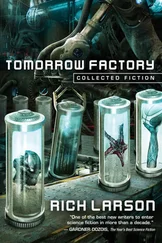Уильям Макгиверн - Collected Fiction - 1940-1963
Здесь есть возможность читать онлайн «Уильям Макгиверн - Collected Fiction - 1940-1963» весь текст электронной книги совершенно бесплатно (целиком полную версию без сокращений). В некоторых случаях можно слушать аудио, скачать через торрент в формате fb2 и присутствует краткое содержание. Год выпуска: 2014, Издательство: Jerry eBooks, Жанр: Ужасы и Мистика, Фантастика и фэнтези, Детектив, Прочие приключения, на английском языке. Описание произведения, (предисловие) а так же отзывы посетителей доступны на портале библиотеки ЛибКат.
- Название:Collected Fiction: 1940-1963
- Автор:
- Издательство:Jerry eBooks
- Жанр:
- Год:2014
- ISBN:нет данных
- Рейтинг книги:3 / 5. Голосов: 1
-
Избранное:Добавить в избранное
- Отзывы:
-
Ваша оценка:
- 60
- 1
- 2
- 3
- 4
- 5
Collected Fiction: 1940-1963: краткое содержание, описание и аннотация
Предлагаем к чтению аннотацию, описание, краткое содержание или предисловие (зависит от того, что написал сам автор книги «Collected Fiction: 1940-1963»). Если вы не нашли необходимую информацию о книге — напишите в комментариях, мы постараемся отыскать её.
Collected Fiction: 1940-1963 — читать онлайн бесплатно полную книгу (весь текст) целиком
Ниже представлен текст книги, разбитый по страницам. Система сохранения места последней прочитанной страницы, позволяет с удобством читать онлайн бесплатно книгу «Collected Fiction: 1940-1963», без необходимости каждый раз заново искать на чём Вы остановились. Поставьте закладку, и сможете в любой момент перейти на страницу, на которой закончили чтение.
Интервал:
Закладка:
Money — that was the snag.
Everywhere, in every time, money was the single essential commodity. It was the symbol of power, of respect, of importance. Therefore, and he had known this all the time, of course, he must have money. Not dollars; they would be worthless in old Rome. But gold I Gold was what he needed. Gold would buy him everything he wanted; friends, power, a seat in the Colosseum.
There was gold in the vaults of the bank, Caesar knew. Bars of it, hundreds of pounds of it, awaiting transfer to Fort Knox. But for the life of him he couldn’t figure out a way to get his hands on it. As an officer of the bank he could enter the vaults easily enough, even after regular banking hours. But he couldn’t take it out, without running squarely into the vault guards. He had rejected a dozen schemes. Even he, an officer of the bank, couldn’t take a large valise or suitcase into the vault and carry it out bulging with gold. He had thought of boldly killing the guards, but that might not be as easy as it sounded. They were armed. He might shoot one of them, but the others would be alerted then, would be pressing alarm buttons, firing at him.
Also, there was the problem of getting out of the bank, even if he did kill the guards, and of eluding the police net that would be thrown instantly about the area.
He saw no way of getting the time machine into the bank, and thence into the vaults. If he could manage that, of course, his problems would be solved. He would have only to load the machine with gold and send himself into the past. But how could he get the machine into the vault? He had thought of crating it and having it delivered to the bank as some sort of a new comptometer, but that was childishly inept. There would be questions, curiosity, people who wanted to inspect it, who would want to know why a comptometer was needed in the vaults.
Wearily, Caesar rubbed his forehead. Then he went to his desk and took a large-scale map of the bank’s immediate neighborhood from the drawer and settled down to study it. He had done this innumerable times before, it seemed, without ever getting any closer to a solution of his problem. He pored over the map, frowning unhappily, peering at the buildings which adjoined the bank, and remembering what he had made a point of learning about the tunnels beneath the bank and the offices on the floors above the vaults. He saw no solution. The vault was at the center of the web of tunnels, corridors, and offices, but it was closely guarded at every possible approach. Caesar began to feel like a rat in a maze. At every turn he ran into a blank, inpenetrable wall.
To get the gold — that was the only flaw.
Everything else was set. Caesar had majored in Latin in college, a result of the same whim on his father’s part which had bestowed on him the name of Caesar. In the past six weeks he had spent his spare time poring over ancient texts, familiarizing himself with the idiom spoken in early Roman times, and studying the mores of the period. He had chosen the middle of the Fourth Centry, A.D., as the time in which he would live out the rest of his life.
That was the flower of Rome’s place in history. The Christian persecutions had ended, but the nobility of Rome lived lives of sybaritic delight. There were the gladiatorial games, the slaughters in the Colosseum — not of Christians, but of law-breakers, fomenters of revolt, and so forth — and the baths, slave girls, splendid villas.
To restore some of his optimism, Caesar went into his bedroom and opened up his closets. There hung a friar’s robe of coarse brown wool. With it was a chain of rosary beads, made of heavy wood, and a pair of cheap leather sandals. Caesar had picked up the outfit in a religious supply store, and had told the clerk blandly that he was buying it for his brother, a missionary in China.
With this outfit, he would make his entrance into the life of Rome. A poor, wandering priest, mumbling his beads, begging a bit of food and a bowl of water from the wealthy homes, he would accustom himself to the milieu of the city, learn what men were powerful, which could be bought, and then, only then, he would convert his gold into power. He would be a man of mystery, a humble, ignorant priest who slowly, imperceptibly, advanced himself into the councils of the mightiest men of Rome. It would be a challenge to his intelligence, to his superior knowledge of history, and it would also be gratifying to his buried need for intrigue and deception.
Caesar sighed, studying his* disguise. Everything was so close to hand that he literally trembled with excitement. Only the money was needed...
The next day he ignored his work at the bank completely, and sat in almost a coma at his desk, worrying his mind desperately for the solution to his problem. Miss Stevens came in and out of his office on routine errands, but he barely glanced at her. The president of the bank stopped by to ask him to lunch, but Caesar begged off with a vague excuse. The president went off frowning. He wanted to speak to Caesar about a certain laxity he had noticed in his work, but the man was obviously too wrapped up in some personal problem to care. Well, a change might be necessary.
Suddenly, Caesar struck his forehead with his hand. He had it! It had come to him from the blue, all in one piece, the perfect scheme to get at the gold and, more important, to get away with it. Rising, he began pacing the floor, feeling an invigorating sense of confidence sweep through his veins. Now the plan was complete! He could put it into effect tonight!
He glanced at his watch. Five o’clock. Plenty of time to make his last-minute preparations. He was still pacing, turning, his plan this way and that with nimble mental fingers, when the door opened and Miss Stevens came in.
“I’m running along now,” she said. “Was there anything else you wanted, Mr. Simon?”
Caesar was recalled to the reality of the present. “No, I don’t think so, Miss Stevens,” he said. She had never looked more lovely to him, he thought. He sighed and wet his lips. This was the last time he would see her, the last time his heart would lurch unsteadily when she came into his office, the last time his body would burn with strange dark desire in her presence. She was wearing a black suit with a rhinestone clip on the collar, and a single strand of pearls about her throat. She stood in the doorway, slim, confident, infinitely desirable, a stray beam of sunlight glinting in her long dark hair.
“Good night, then,” she said, and smiled.
He could not let her go. “Just one minute, please,” he said.
“Yes?”
No, he couldn’t let her go! “I’m terribly sorry, Miss Stevens, but I just remembered something,” he said. “Could you stay tonight and do a small job for me? I— I’ll make it up to you next week. You may have a whole day off.”
“Oh, that’s all right, Mr. Simon,” she said. She smiled philosophically. “What is it?”
Caesar felt rather giddy. This wasn’t part of the plan. He wasn’t prepared. Not now! Once, at the beginning of his dream, he had thought of taking her with him, by force, if necessary. That was why he had asked her to stay and work one night, and to deliver the letters to the hotel. He had planned to make this a customary thing, once every couple of weeks perhaps, so that any suspicions she might entertain would be lulled. Then, when everything else was ready, he would ask her to bring some work to his apartment — or to the factory in the country. She would do it, of course, suspecting nothing, and then he would make her come with him, back to the ancient evil glory of Rome. That had been the dream. But he had scrapped it. It was too uncertain, too risky. But now, seeing her like this, and knowing it would be for the last time, he threw caution to the winds. He would take her with him, back to Rome.
Читать дальшеИнтервал:
Закладка:
Похожие книги на «Collected Fiction: 1940-1963»
Представляем Вашему вниманию похожие книги на «Collected Fiction: 1940-1963» списком для выбора. Мы отобрали схожую по названию и смыслу литературу в надежде предоставить читателям больше вариантов отыскать новые, интересные, ещё непрочитанные произведения.
Обсуждение, отзывы о книге «Collected Fiction: 1940-1963» и просто собственные мнения читателей. Оставьте ваши комментарии, напишите, что Вы думаете о произведении, его смысле или главных героях. Укажите что конкретно понравилось, а что нет, и почему Вы так считаете.

![Уильям Макгиверн - Завтра опять неизвестность [английский и русский параллельные тексты]](/books/35168/uilyam-makgivern-zavtra-opyat-neizvestnost-angli-thumb.webp)









